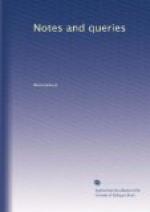A similar kind of blunder
was made by the Greek
writers in the name Elagabal,
which they transformed
into Heliogabal, from “[Greek:
Helios], the sun.”
With regard to Charles Martel, Michelet does not allude to M. Collin de Plaucy’s explanation, and adopts the old version—
“Son surnom paien de Marteau me ferait volontiers douter s’il etait chretien. On sait que le marteau est l’attribut de Thor, le signe de l’association paicune, celui de la propriete de la conquete barbare.”—Vide Michelet’s Origines du Droit Francais.
Charles was notoriously at variance with the Church. I should consider Michelet a much better authority than M. Collin de Plaucy, who, to judge from his preface to another work, Le Dictionnaire Infernal, slavishly submits his critical acuteness to the dicta of his Church.
J.B.D.
* * * * *
“FEAST” AND “FAST.”
I am not going to take part in the game of hockey, started by LORD BRAYBROOKE, and carried on with so much spirit by several of your correspondents in No. 28.; but I have a word to say to one of the hockey-players, C.B., who, per fas et nefas, has mixed up “feast and fast” with the game.
C.B. asks, “Is not the derivation of ‘feast’ and ‘fast’ originally the same? that which is appointed connected with ‘fas,’ and that from ‘fari?’” I should say no; and let me cite the familiar lines from the beginning of Ovid’s Fasti:—{12}
“Ne tamen ignores variorum jura
dierum
Non habet officii Lucifer
omnis idem.
Ille Nefastus erit per quem tria verba
silentur:
Fastus, erit per quem
lege licebit agi.
Neu toto perstare die sua jura putaris;
Qui jam Fastus erit,
mane Nefastus erat.
Nam simul exta Deo data sunt, licet omnia
fari;
Verbaque Honoratus libera
Praetor habet.”
The dies festus was not only not dies fastus, but dies nefastus.
Without going beyond feast and fast, I see nothing in C.B.’s suggestion better than the old derivations of the words feast from festus -um, and fast from the Anglo-Saxon; nor indeed anything half so good. Feast and fast are opposed in meaning: our word fast has a meaning which neither fas, fari, nor fastus, nor all three together, will explain.
CH.
* * * * *
+Replies to Minor Queries.+
The Badger’s Legs (Vol. i., p. 381.).—In answer to one of your correspondents, who inquires whether there is any allusion to the inequalities of the badger’s legs previous to that made by Sir T. Browne:—
“And as that beast hath legs (which
shepherds fear,
’Yclept a badger, which our lambs
doth tear),
One long, the other short, that when he
runs
Upon the plain, he halts, but when he
runs
On craggy rocks, or steepy hills, we see
None runs more swift or easier than he.”




